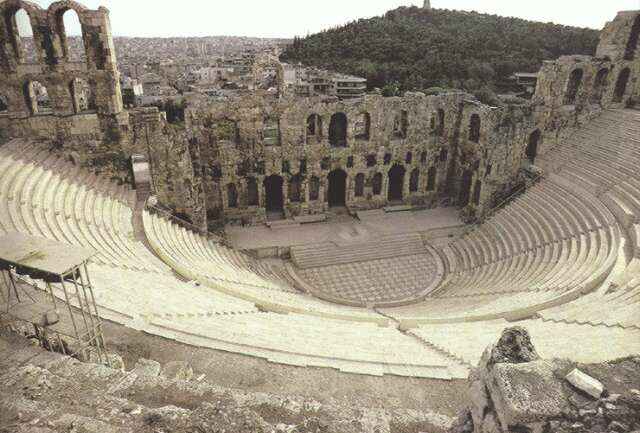雅典,這個(gè)名字會(huì)令人想到擁有高大的、白色羅馬柱的建筑物和希臘諸神的雕像。博物館將游客帶回古希臘時(shí)代。當(dāng)游客造訪此城時(shí),會(huì)覺(jué)得仿佛置身于歷史課堂上
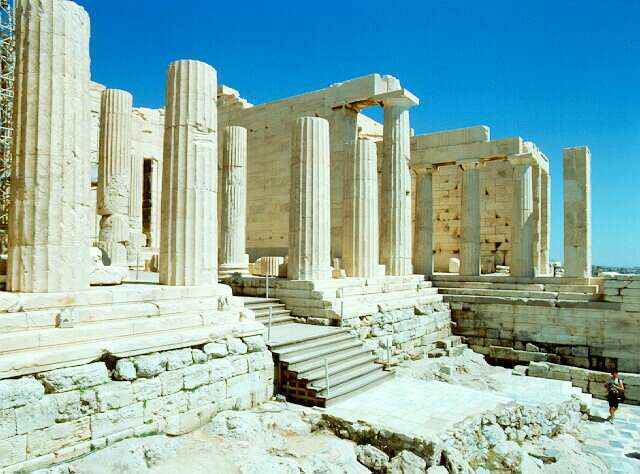
Athens gave birth to Western culture. This is where the West's ideas of government, law, justice and liberty all began. Architecture4, science, drama and poetry also flourished here.
雅典是西方文明的搖籃,西方的政府、法律、公正和自由這些理念,都起源于此。建筑、科學(xué)、戲劇和詩(shī)歌也曾在這里盛極一時(shí)。
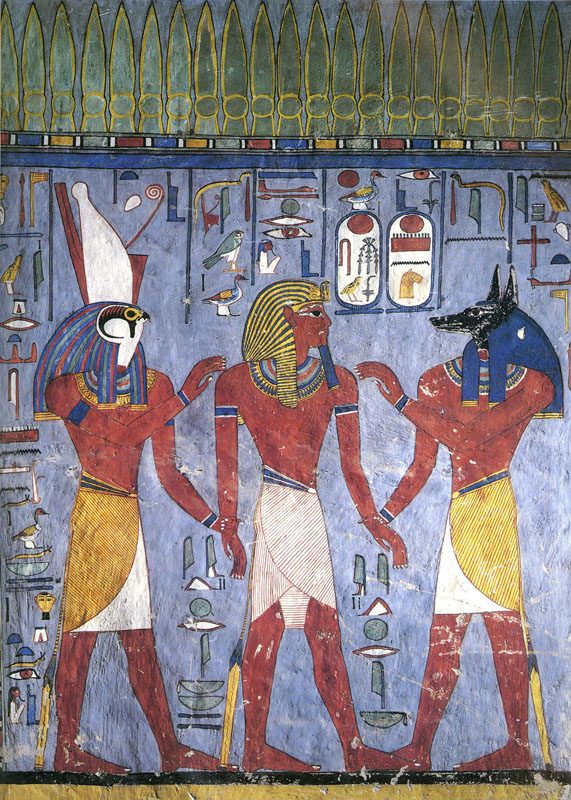
The history of Athens is tied to mythology5. The god that came up with the most valuable legacy6 for humans was to give the city its name. Poseidon and Athena7 each wanted the honor. Athena produced an olive8 tree—the symbol of peace and wealth. Poseidon offered a strong horse needed for war. The gods decided Athena's gift would better serve the people, and the city became known as Athens.
雅典的歷史與神話密不可分。哪一個(gè)神帶給人類最寶貴的遺產(chǎn),就可以用他的名字為此城命名。海神波塞冬和雅典娜女神都想得到這份殊榮。雅典娜造了一棵橄欖樹(shù),象征和平與財(cái)富。波塞冬則獻(xiàn)出一匹驍勇善戰(zhàn)的馬。后來(lái)諸神裁定雅典娜的禮物對(duì)人類更有意義,于是此城就被命名為“雅典”。
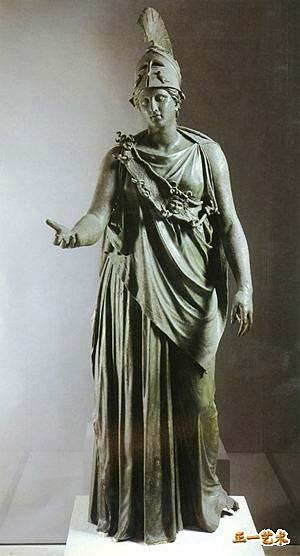
The Acropolis9, or “high city,” stands on a hill overlooking the city. Western civilization's most important ancient monument10 was built by Pericles, the leader of Athens from 461-429 B.C. He spared no expense11 when he constructed the buildings of the Acropolis. He used only the best materials, architects and artists. His artists created huge statues of marble12 and covered them with gold and jewels. Sadly, only ruins remain of this “high city” of temples.
阿克羅波利斯,或稱“高城”,聳立在一座山上俯瞰全城。它是西方文明最重要的古老遺跡,由公元前461至429年間的雅典統(tǒng)治者——伯里克利所建。他不惜成本建造阿克羅波利斯。他只用最好的材料、建筑師和藝術(shù)家。他的藝術(shù)家雕刻了巨大的大理石雕像,外鑲以黃金和寶石。可惜的是,這個(gè)由神殿組成的“高城”如今只剩下一片廢墟。
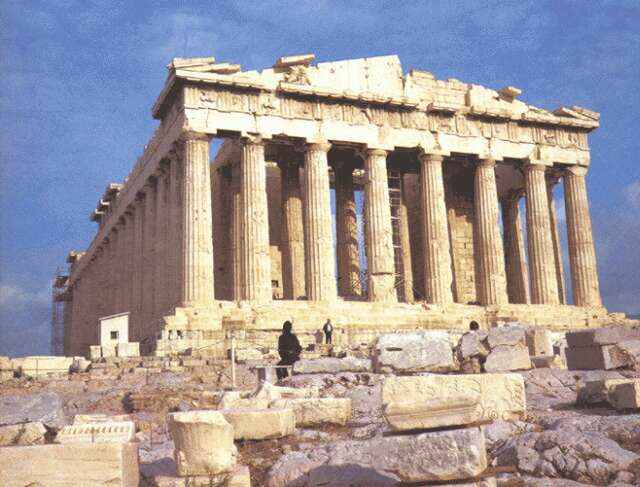
More treasure of ancient Greece lies in the National Archaeological13 Museum. Opened in 1874, the museum contains the best collection of Greek art in the world. It is crammed14 with treasures—more than visitors can see in a single visit. Visitors can view treasures from all the ancient civilizations that controlled the city throughout history. The vases, statues, carvings and other art objects show the life of those who lived in ages past.
“國(guó)家考古博物館”中收藏著更多的古希臘珍品。這個(gè)博物館于1874年開(kāi)放,里面收藏有全世界最珍貴的希臘藝術(shù)品。館中滿是寶物,訪客無(wú)法一次看完所有收藏品。在這里游客可以見(jiàn)到歷史上每一個(gè)統(tǒng)治此城的文明所留下的珍寶。花瓶、雕像、雕刻品和其他藝術(shù)品展現(xiàn)出歷朝歷代人們的生活
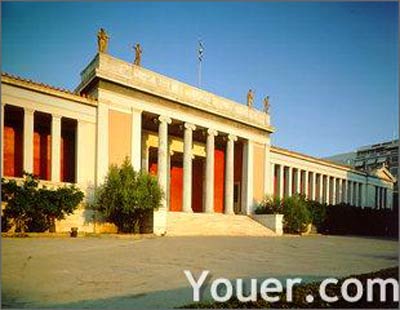
But a visit to Athens is more than a lesson in ancient history. Modern Athens hums with activity. The city offers every modern convenience.
但是,到雅典一游不只是去上一堂古代歷史課。現(xiàn)代的雅典十分繁榮。這個(gè)城市各種現(xiàn)代化設(shè)施應(yīng)有盡有。
One thing that hasn't changed since ancient times, though, is Greek hospitality15. Ancient Greeks believed that a stranger might be a god in disguise16. Therefore, they always treated strangers kindly. Nowhere else in Europe will you find people who invite complete strangers to their homes for coffee or dinner.
可有一件事自古至今仍未改變,那就是希臘人的好客。古希臘人相信,陌生人可能就是神的化身,所以他們總是善待陌生人。全歐洲只有這個(gè)地方的人,會(huì)邀請(qǐng)一個(gè)完全陌生的人到家里喝咖啡或吃晚飯。
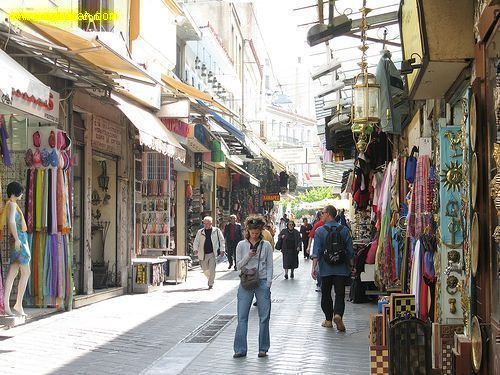
If you do go to a Greek home for dinner, do your best to eat everything on your plate. Uneaten food insults the cook. Taking second helpings is the best way to show how much you enjoy the meal.
如果你真的到希臘人家里吃晚飯,一定要盡量把你盤(pán)中的食物吃光。東西沒(méi)吃完對(duì)廚師是一種侮辱。吃完再要第二份,最能表示出你吃得多盡興。
